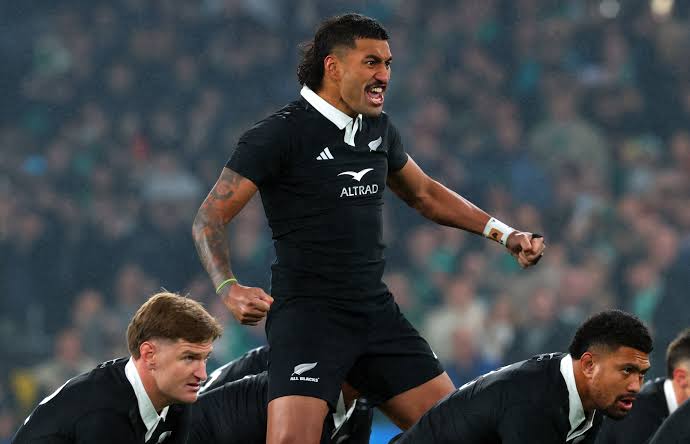
How the All Blacks’ 23–13 victory over Ireland in Dublin was received by the international media.
Denis Walsh, Irish Times: Ireland fails to ignite
Like a wet fuse on a firework, it blew out to nothing. The words were stuck in their throats, despite Ireland having been waiting for 13 months since the World Cup quarterfinal to express their feelings to New Zealand. After halftime, everything was fumbling and steaming, with the world’s top team playing brilliantly for ten minutes or so.
Even if they aren’t as good as they were in the World Cup, New Zealand simply needed to be cute and capable to defeat Ireland by ten points. It is difficult to recall a significant Test match in which Ireland committed numerous errors. They just flooded the engine each time they pushed the accelerator and flipped the ignition key. Not moving at all. stuck.
But winning streaks and world rankings alone cannot convey the difference. Ireland now anticipates defeating New Zealand. The performance last night was extremely difficult to accept because there are no justifications or list of respectable substitutes. New Zealand was the cholesterol that Irish rugby couldn’t get rid of. The risk of a cardiac event persisted even after ten years of improved results.
It was neither beautiful nor thrilling, and in many respects, it was a traditional Test match, complete with comedy errors and fierce competition. It would have been unthinkable at any other point in our Test history for Ireland to defeat New Zealand while making so many simple mistakes, and that fact hasn’t altered.
The Irish offensive failed due to mistakes.
Thornley, Gerry, Irish Times
There was hardly a hint of retaliation for that Paris quarterfinal, save from a brief moment when they took the lead early in the second half. In a thrilling match, the All Blacks snapped Ireland’s winning streak of 17 games; they were the more worthy winners here. In doing so, they snapped Ireland’s home winning streak of 19 games on an oddly quiet night at the Aviva.
Even though Ireland might have an advantage in fitness, the All Blacks were always going to be the more match-hardened team because they had played nine Test matches since Ireland’s victory in Durban, including two in the last two weeks. The former turned out to be more accurate.
For a brief while, Andy Farrell’s words at halftime had the desired impact, as his team increased their enthusiasm and intensity even further, particularly in their counter-rucking. However, it came at a price: they were hit with a devastating 13-5 penalty count and a series of breakdown penalties.
The All Blacks, on the other hand, gained more confidence as a result of their home mistakes, numerous penalties, and Damian McKenzie’s mostly flawless six-penalty kick. In the end, they disregarded the slippery pill by using both the larger carries in contact and the slicker handling.
Error-filled Ireland fails to meet clinical Every Black
The Daily Telegraph’s Gavin Mairs
Reports of the All Blacks’ doom appear to have been considerably overblown. Scott Robertson’s job as head coach of New Zealand had been dubious due to a mediocre Rugby Championship season, and in July, England had twice challenged his team in close games at home.
However, his team ultimately achieved a decisive win that will undoubtedly mark the beginning of a new era for the All Blacks on the night that Robertson made an emotional reunion with the Northern Irish family he had lived with as an 18-year-old during a year-long rugby exchange.
The passion and amazing skill levels of their previous meeting in the World Cup quarterfinal in Paris last year were not reached in this match. In that thrilling match, New Zealand hung on for dear life, but in the end, it was a lot easier win, with Ireland’s attempt to get revenge for that World Cup loss stumbling to a low-key conclusion.
It is true that Ireland made a relatively high amount of unforced errors, but many of them were a result of New Zealand’s oppressive pressure. Wallace Sititi, a new superstar discovered by Robertson, improved on his outstanding performance against England with a more determined and focused performance that made him a thorn in Ireland’s defensive line and a problem at the breakdown.
Ireland lost because of their discipline.
Gault, Matt, BBC
In an Autumn Nations Series match that failed to provide a new exciting chapter to one of rugby’s greatest rivalries, Ireland lost to New Zealand, their first home loss in over three years.
Damian McKenzie, a fly-half for New Zealand, scored six penalties to give the All Blacks their first victory on Irish soil since 2016.
Despite losing Jordie Barrett to a yellow card for a high challenge on Garry Ringrose, McKenzie’s three penalty kicks gave New Zealand a 9–6 halftime advantage.
Josh van der Flier gave the home team a much-needed try to give Ireland a numerical edge and a spectacular start to the second half.
Will Jordan’s try, his 37th in 39 Test matches, ended the home team’s chances of avenging their defeat in the World Cup quarterfinals last year, but Ireland’s discipline cost them as McKenzie scored three more penalties.
Ireland is humbled by the All Blacks’ underdog victory.
Napier, Liam, NZ Herald
After overcoming adversity, including a six-day turnaround, notable absences from Beauden Barrett and Codie Taylor, and a first-half yellow card for Jordie Barrett, the All Blacks summoned their best performance of the year to claim their most significant scalp. They deserved this victory.
After a shaky start to the season, this All Blacks side is clearly growing, maturing, and finding their identity as evidenced by their consecutive victories over England and Ireland on their cherished home patches.
In the midst of sledging and animosity, this competition was more of a gruelling slugfest than a spectacular show.
In Dublin, Scott Robertson and the All Blacks resurrect
Paul Gregor, NZ Herald
A disciplined, destructive, and patient victory over the world’s top team has created a strong feeling that the All Blacks are reviving and capable of constant, rather than intermittent, brilliance during a season when optimism has only been a glimmer.
Dublin, which is now thought to be a harder place to win than Ellis Park, turned out to be a joyful rather than eerie hunting ground for the All Blacks, who put on a statement performance that was equally significant in establishing the credentials of the respective coaching regimes even though it was not as spectacular or well-polished as the one they gave to defeat Ireland at the World Cup.
The All Blacks’ victory in Dublin shows that they haven’t regressed in the past year and gives Scott Robertson’s team reason to believe they are continuing to build on Ian Foster’s legacy.
CLICK HERE FOR MORE







